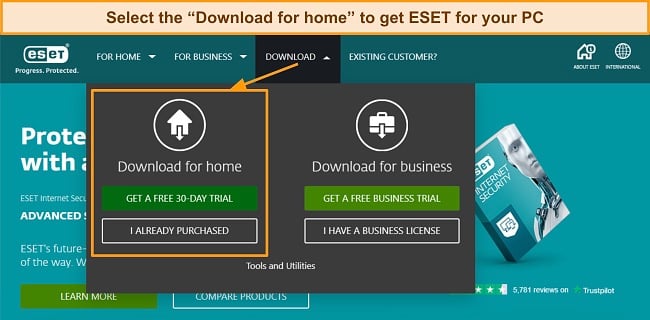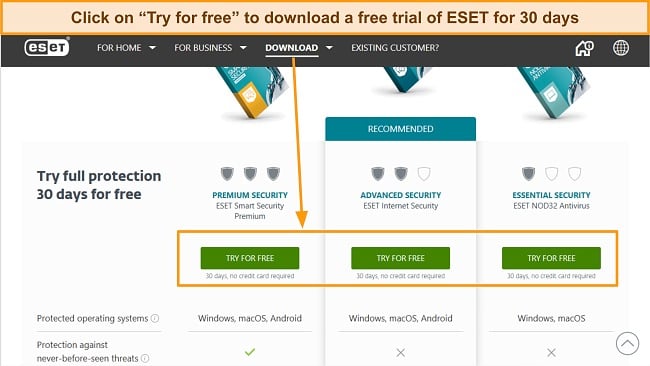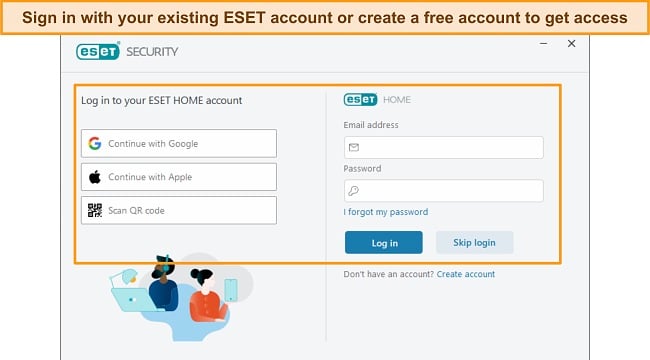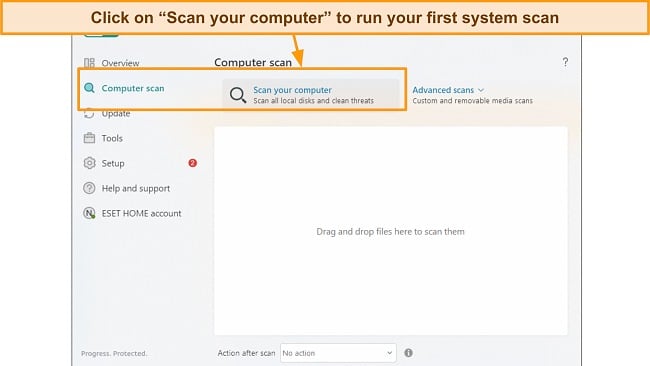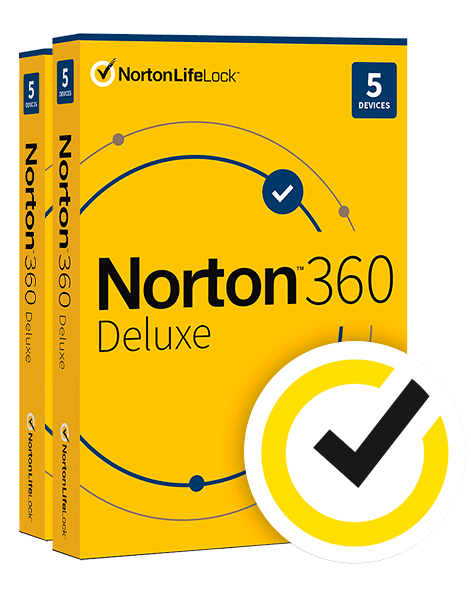ESET vs Microsoft Defender 2024: Which Is The Best Antivirus
You may be wondering if ESET is better than Microsoft Defender or whether the Windows default protection is adequate for you. Choosing the right protection for your PC is important, especially with the ever-increasing number of cyber threats.
While ESET and Microsoft Defender will protect you from malware threats, there must be a clear winner. So, I tested both antiviruses using 15 different criteria including malware detection abilities, security features, and other offerings so you can choose the right option.
From my tests, I found that ESET is better than Microsoft Defender in almost every category. ESET’s perfect detection scores and security features set it apart from Microsoft Defender. I recommend trying ESET risk-free using the 30-day money-back guarantee.
Try ESET risk-free for 30 days
No Time? Here’s a 1-Minute Summary of Category Winners
ESET and Microsoft Defender both protect you from malware threats with different levels of security. However, ESET’s robust security features and ease of use makes it the best option among the duo.
 |
 |
|
| Virus Scanner | 100% malware detection rates | 99.5% malware detection rates |
| Real-Time Malware Protection | Blocks 100% of real-time threats | Only detects 99% of real-time threats |
| System Performance | Lightweight program and consumes fewer system resources | Can use up to 50% CPU when copying files |
| VPN | ✘ | ✘ |
| Parental Controls | Basic parental controls | Comes with more features |
| Firewall | Offers a robust firewall that’s easy to set up | The firewall lacks advanced reporting capabilities |
| Password Manager | Basic password manager that lets you store unlimited logins | ✘ |
| Gaming Mode | Stops notifications when running a full-screen app | ✘ |
| Optimization Tools | ✘ | ✘ |
| Other Features | Anti-theft, payment protection, and encrypted virtual drive | Free 5GB cloud backup |
| Device Compatibility | Windows, Mac, and Android | Windows only |
| Customer Service | Fast and responsive customer support channels | Helpful customer support across all channels |
| Price | Decent pricing plans, but not suitable for multiple devices | ✘ |
| Free Version | ✘ | 100% free |
| Money-Back Guarantee | 30-day money-back guarantee | ✘ |
How I Tested and Compared ESET vs Microsoft Defender
- Virus Scanner — I compared the scanner types and malware detection rates of both antivirus programs.
- Real-Time Malware Protection — I evaluated the ability of each antivirus to block real-time threats and zero-day malware.
- System Performance — I analyzed my device’s performance while running both antiviruses to see which one affected it the most.
- VPN — I checked if both antiviruses have a VPN for encrypting my internet connection.
- Parental Controls — I tested the parental controls app of both antivirus programs.
- Firewall — I enabled firewall protection and monitored how it protected me from network attacks.
- Password Manager — I looked for the standout features of the password manager of the antivirus apps.
- Gaming Mode — I examined how the gamer mode feature optimized my gaming performance.
- Optimization Tools — I checked to see if there were any device optimization tools on the antivirus programs.
- Other Features — I tested the extra features to determine the option with the most valuable features.
- Device Compatibility — I compared the system requirements and platforms supported by both antiviruses.
- Customer Service — I contacted customer support to determine the helpfulness of the support channels.
- Price — I examined the pricing options in the antivirus to find the most valuable pricing plan.
- Free Version — I tested the features in the free version of the antivirus.
- Money-Back Guarantee — I used the money-back guarantee to test the features of the security suite.
1. Virus Scanner — ESET Offers Perfect Malware Detection Rates and Faster Scan Times
ESET beats Microsoft Defender in malware detection rates so it wins this category. During my tests, ESET detected 100% of known and emerging cyber threats, better than Microsoft Defender’s 99.5% detection rates.
When it comes to scanning options, Microsoft Defender offers 1 additional option compared to ESET. However, you may not need many scan options as a full or quick scan is often adequate to get rid of most types of malware threats.
ESET has 3 scan types:
- Full scan — checks your entire hard drive for malware.
- Custom scan — selects specific locations on your system that you want to scan.
- Removable media scan — scans external media like USB sticks.
Microsoft Defender offers 4 types of scans:
- Quick scan — checks critical areas of your system.
- Full Scan — scans your entire computer for malware threats.
- Custom — chooses a specific location and files to scan.
- Microsoft Defender Offline scan — reboots your system and attempts to remove stubborn malware before the OS loads.
As for speeds, I found ESET was faster than Microsoft Defender. In my tests, ESET took 30 minutes to scan my entire system whereas Microsoft Defender took a little over an hour for the same scan. I also discovered that in subsequent scans, ESET targets files that have recently changed. This means following scans will be even faster.
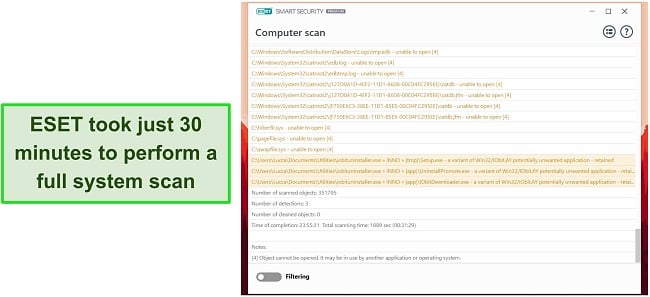
With ESET having faster scan times and perfect detection rates, it wins this round. You can get ESET and protect your computer risk-free using the 30-day money-back guarantee
Virus Scanner Winner: ESET
2. Real-Time Malware Protection — ESET Blocks 100% Of Real-Time and Zero-Day Malware
ESET performs slightly better than Microsoft Defender in detecting zero-day malware threats. During tests, ESET scored 100% in real-time protection, putting it head-to-head with the best antiviruses on the market. However, Microsoft Defender’s real-time protection comes close at a 99% rate.
I conducted additional tests to compare the real-time protection of both antiviruses. During the test, I downloaded malware samples from EICAR while both antivirus programs were running in the background. ESET proved to be effective in blocking all attempted malware downloads, including those in zip files. In contrast, while Microsoft Defender managed to stop most of the malware downloads, it could not detect malware in zip files.
ESET and Microsoft Defender will protect you from phishing threats as well. If you click on a suspicious link, the antiviruses will notify you concerning the dangers of the attempted visit and block access to the site.
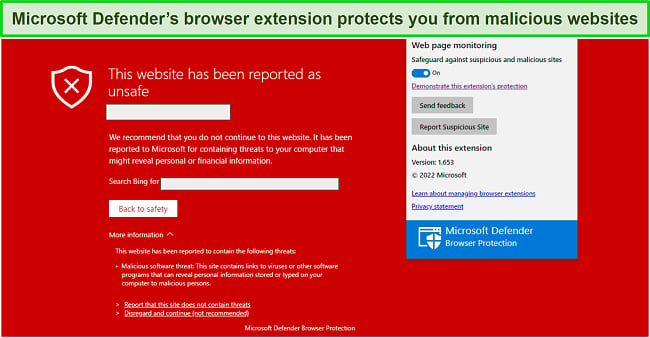
Both antiviruses provide decent protection against ransomware threats. Ransomware threats mostly target Windows devices, allowing the attacker to encrypt the victim’s files unless they pay a ransom. Microsoft Defender has a Controlled folder access feature that’ll let you specify certain folders so unauthorized apps can’t make any changes to them. ESET will also protect your PC from ransomware and other forms of malware.
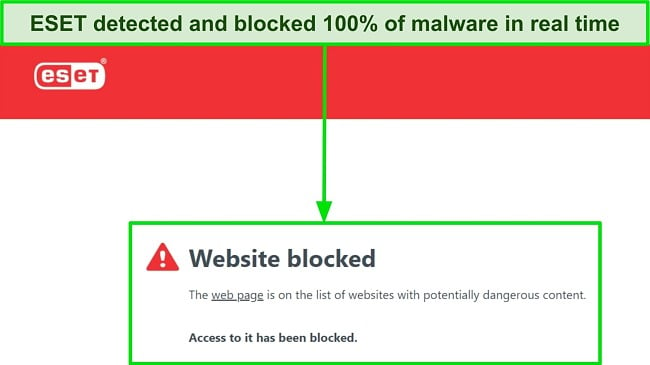
To combat ransomware threats, ESET employs a Host Intrusion Prevention System (HIPS) and its corresponding Ransomware Shield feature. This security system monitors program behavior and any suspicious activity is instantly blocked and terminated. Additionally, HIPS can be customized to specify which files or folders should remain unaltered.
Overall, ESET provides top-tier protection against real-time malware attacks, phishing attempts, and other online threats. However, Microsoft Defender comes close and offers nearly flawless protection.
Real-Time Malware Protection Winner: ESET
Block malware threats using ESET
3. System Performance — Both Antivirus Programs Are Light-Weight
ESET and Microsoft Defender are both lightweight antivirus programs, but ESET consumes fewer system resources overall. To measure the impact on the performance of my system, I recorded my laptop’s CPU, memory, and disk utilization. Then, I compared the values when running a scan and when not.
In my tests, I discovered that ESET caused my CPU utilization to surge from 4% to 29% and my memory utilization to climb from 80% to 84% when performing a full disk scan. However, Microsoft Defender’s full scan caused my CPU utilization to spike from 5% to 100%, but my memory utilization remained stable at 74%.
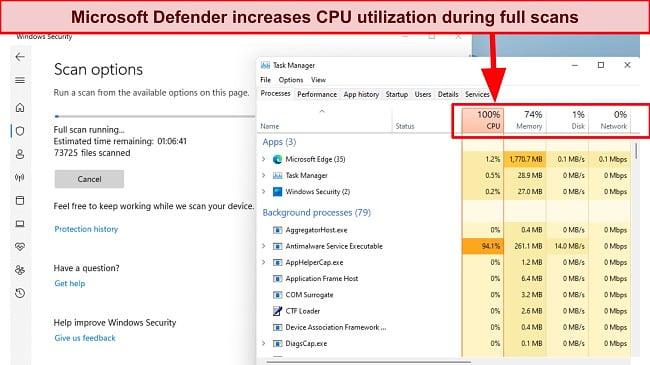
To evaluate their impact on system performance, I conducted a series of tasks such as launching applications and opening web pages while running both antivirus programs in the background. The table below presents the slowdowns I encountered:
| ESET | Microsoft Defender | |
| Slowdown while opening websites | 21% | 16% |
| Slowdown when launching applications | 7% | 5% |
| Slowdown when copying files | 2% | 40% |
Overall, ESET is a better choice as it utilizes fewer CPU resources during a scan or copying of files. However, both antiviruses won’t cause a significant slowdown to your computer.
System Performance Winner: ESET
Try ESET risk-free for 30 days
4. VPN — ESET and Microsoft Defender Offer No VPN
Both ESET and Microsoft Defender offer no VPN, so there’s no winner in this category. If you want an integrated VPN and antivirus package you can instead use Norton’s Secure VPN. Norton provides robust security features, fast speeds, and access to all major streaming platforms like Netflix, Hulu, Amazon Prime, and BBC iPlayer.
Norton offers monthly and yearly plans that support between 1-10 devices. With a starting price of $29.99/per month, you get access to many of the VPNs security features, including its military-grade encryption, Wi-Fi security, and servers in 30+ countries.
Browse securely with Norton VPN
5. Parental Controls — Microsoft Defender Offers More Parental Control Features
ESET and Microsoft Defender both offer a basic parental control app that functions more like a content filter. You can use it to block access to specific sites or content that may be harmful to your kids. This includes a mix of violent, pornographic, or drug-related content, and others.
In my tests, ESET blocked every category-wide harmful content across all the devices I set it up on. It also logged all the blocks and the time I tried accessing the restricted website. This is good considering it helps monitor your child’s activities properly, allowing you to know which sites they tried accessing.
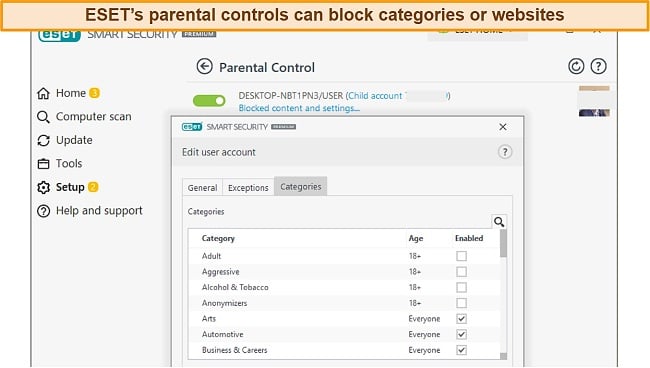
Microsoft Defenders also offers a decent parental control feature. However, you can only use it on the Microsoft Edge browser. The app allows you to carry out the following controls:
- Choose what sites your child visits
- Set a time when your kids can use their phones
- Receive weekly reports of your child’s activities
- Monitor the health and safety of all devices registered with your account
- Monitor the games and apps that your kids can buy or download
You can enable parental controls from your Windows’ “Family Options” tab by clicking on the “View Family” settings. However, these controls require a Microsoft account, which could be a limitation if your children utilize different operating systems or web browsers besides Microsoft Edge.
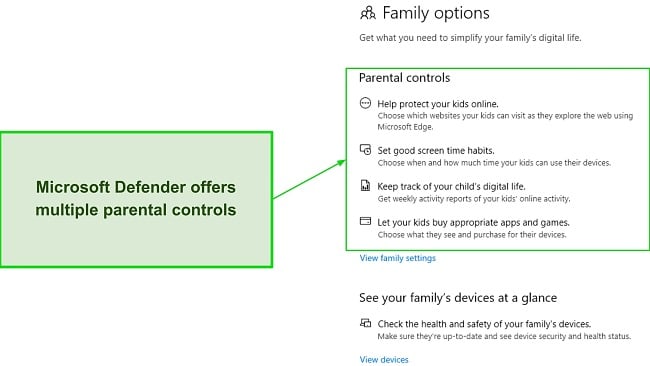
There’s no winner in this round. This is because both ESET and Microsoft Defender’s parental controls are relatively weak and only offer a fraction of what you can get with competitor antivirus programs like Norton.
Parental Controls Winner: Tie
6. Firewall — ESET Offers Customizable Firewall Options
ESET and Microsoft Defender both provide decent firewall protections, but I found ESET’s firewall to be more customizable and easy to use. It successfully blocks off all unauthorized connections and offers different firewall modes as follows:
- Automatic mode — this mode blocks off most inbound connections whilst allowing most outbound connections.
- Interactive mode — allows you to choose whether to block or permit unrecognized traffic.
- Learning mode — an AI-based system that automatically saves rules on your activities to train the firewall.
While Microsoft Defender’s firewall is relatively straightforward, it has a few limitations when compared to ESET. It is not as user-friendly and lacks advanced reporting capabilities. However, it does offer the ability to create rules for inbound and outbound connections and can be configured on private, public, or domain networks.
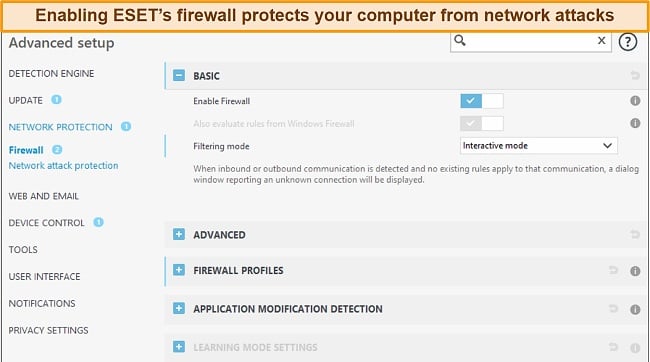
While Microsoft Defender’s firewall provides decent protection, it is not as comprehensive as ESET’s firewall and can be more challenging to configure. Therefore, ESET wins this round. Overall, both firewalls protected my device effectively from network attacks.
Firewall Winner: ESET
Block network attacks with ESET firewall
7. Password Manager — ESET Provides a Basic Password Manager
Only ESET comes with a password manager among the two antiviruses. ESET’s password manager protects your passwords with industry-standard AES-256-bit encryption. It offers the following features:
- Password generator
- Secure Notes
- Multi-device syncing
- Auto-fill and Auto-save
- Leaked password checker
- Two-factor authentication
ESET’s password manager is user-friendly. The Android and iOS apps are easy to set up and use, likewise the browser extension for Chrome, Firefox, and Microsoft Edge. On these apps, you can save credentials, generate secure passwords, and autofill them on respective websites or apps. However, ESET lacks features like dark web monitoring, and password sharing.
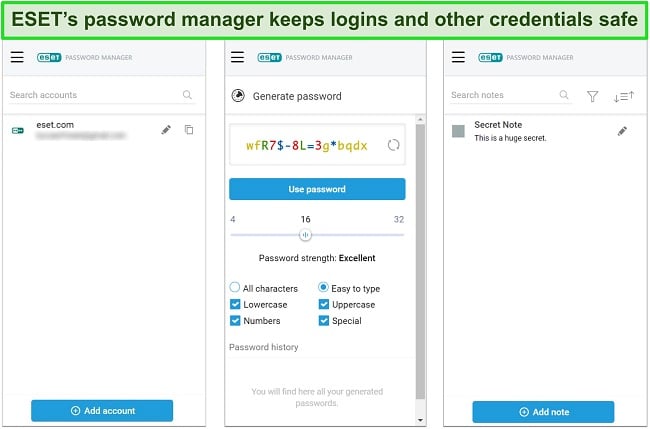
When it comes to features, ESET’s password manager falls short in comparison to those included in Norton or Bitdefender antivirus programs. However, ESET comes out on top in this category as Microsoft Defender doesn’t have a password manager.
Password Manager Winner: ESET
Organize your passwords with ESET
8. Gaming Mode — ESET Has a Basic Gaming Mode Feature
ESET offers a basic Gamer Mode feature. It prevents notifications and halts task scheduler activity (such as scheduling system scans) that would otherwise disrupt gameplay. Theoretically, it should also reduce CPU usage by eliminating unnecessary background tasks. However, during my test while playing Call of Duty: Warzone and Rocket League, I did not observe any improvement in performance.
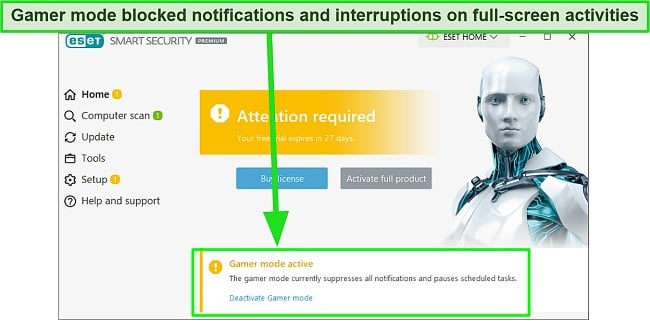
The Gamer Mode feature on ESET protects your gaming by ensuring it:
- Deactivates and delays heavy tasks like deep scanning
- Prevents interruption by turning off notifications
- Prevents alerts that demand user interaction
- Blocks unnecessary background tasks
Overall, ESET’s Gamer Mode doesn’t do anything out of the ordinary. However, since Microsoft Defender doesn’t have a Gaming Mode feature, ESET wins this round.
Gaming Mode Winner: ESET
9. Optimization Tools — Both Antiviruses Lack Performance-Enhancing Tools
Both antivirus programs don’t offer performance-optimizing tools. ESET only offers a System Cleaner tool that doesn’t really enhance system performance. Instead, it’s only useful for restoring your system to a prior state, resetting system settings, and modifying appearance.
In comparison, TotalAV provides a wide range of PC optimization tools to help your system run faster. For instance, the Smart scan doesn’t just remove malware, but also junk files, browser cookies, registry, and duplicate files. Plus, you can use TotalAV to optimize your system boot time and uninstall unused applications.
Given that both ESET and Microsoft Defender lack device optimization tools, this round ends in a draw. If you need an antivirus with many optimization features, TotalAV is your best bet.
Optimization Tools Winner: Tie
10. Other Features — ESET Offers More Extra Features
ESET and Microsoft Defender both offer extra features, but you’ll get more with ESET. These features include:
- Webcam protection — protects your webcam from abuse and access by unauthorized apps.
- Secure Data — allows you to create a virtual encrypted drive on your computer or external drive to store sensitive information.
- Email and Anti-spam protection — scans your emails and blocks spam messages and phishing links.
- Anti-theft — helps you track your device if it gets stolen.
- Bank and payment protection — creates a secure browser that protects your data from theft and misuse when performing financial transactions.
Microsoft Defender offers:
- OneDrive Cloud Backup 5GB — back up your files (up to 5GB free and more upon upgrade) ensuring you don’t lose any of your important files.
ESET beats Microsoft Defender here as it offers more extra features that provide additional protection to your device.
Other Features Winner: ESET
Get additional protection on ESET
11. Device Compatibility — ESET Is Compatible With All Major Operating Systems
ESET is compatible with most platforms, but Microsoft Defender is only compatible with Windows. While I found Microsoft Defender easy to use, its lack of support for other operating systems makes it unreliable for protecting all your devices.
ESET is compatible with:
- Windows (Home Server 2011 64-bit, 7 SP1, 8.x, 10)
- macOS (10.12-11)
- Linux (LSB 3.1, GTK+ 2.6 or newer, GNU C Library 2.3 or newer, Debian and RedHat with kernel 2.6.x)
- Android
The installation process was straightforward — I downloaded the installer file, and it automatically completed the installation within minutes when executed. ESET’s installation size is also relatively small, measuring only 77.9MB, which is notably smaller than some antivirus software that can exceed several hundred megabytes in size.
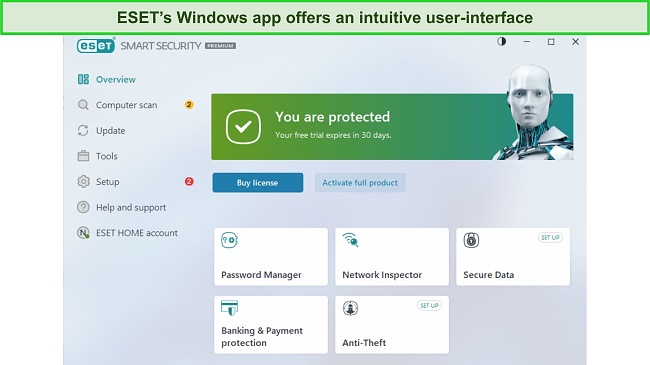
ESET is a clear winner here as it is compatible with most operating systems. The apps are also very easy to set up, and the interface is user-friendly. In summary, ESET is the best antivirus program among the duo for comprehensive protection.
Device Compatibility Winner: ESET
12. Customer Service — Both Antiviruses Offer Excellent Support Services
ESET and Microsoft Defender both offer excellent support options across different channels. ESET provides a range of support options that cater to varying levels of urgency, including live chat for immediate assistance and detailed guides for users not in a rush. I discovered that all 4 support options were easily accessible, and I was able to obtain useful information for any issues I encountered.
To test ESET’s live chat, I sent a chat and I was quickly transferred to an agent who answered my questions satisfactorily in less than 2 minutes. The email-support option didn’t disappoint either as I got a detailed answer to my question within 24 hours. Even better is that ESET offers support in 36 different languages, including English, Spanish, and French.
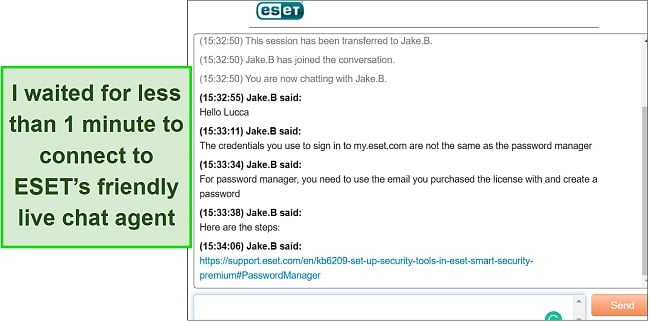
Microsoft Defender’s support is one of the areas the antivirus excels. Within minutes, the live chat feature provided me with all the assistance I required. Additionally, the program offers a valuable knowledge base, how-to videos, and telephone support if necessary.
In my experience with Microsoft’s live chat support, the agent requested my phone number in case the chat got disconnected so they could call me back. I found it thoughtful of them to take that extra step and ensure that they can still assist me even if the chat connection fails, something that not many antivirus programs provide.
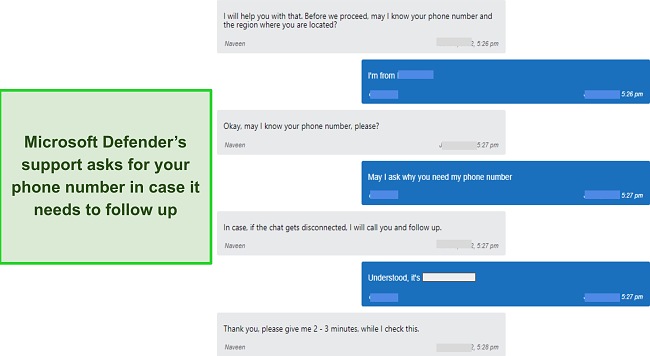
Overall, both ESET and Microsoft Defender offer fast and responsive support channels. So, if you run into any issues when using the programs, you should be able to get them sorted in a few minutes through the different available channels.
Customer Service Winner: Tie
Get Help anytime when using ESET
13. Price — ESET’s Premium Plans Provide Excellent Value for Money
Microsoft Defender is only available free for Windows devices. Unlike Microsoft Defender, ESET has premium plans with excellent value across different devices.
ESET offers 3 main plans for Windows (NOD32 Antivirus, Internet Security & Smart Security Premium), 2 plans for Mac (Cyber Security & Cyber Security Pro), and 1 plan for Android (Mobile Security For Android).
The available features across the plans include:
- Malware, ransomware, and anti-phishing protection
- Gamer Mode
- System cleaner
- Antispam
- Firewall
- Webcam protection
- Network attack and botnet protection
- Banking and payment protection
- Parental control
- Password manager
- Anti-theft
While ESET offers different features across multiple devices, it comes with a few limitations. One of the downsides is that each plan only covers 1 device by default. So, if you need to cover more devices, you will have to pay extra, which can quickly add up.
Among all the plans, I recommend the Smart Security Premium package. It is the most feature-rich plan, and protects Windows, Mac, and Android devices, detecting even zero-day threats. It also comes with a password manager, which gives you unlimited password storage.
Given that only ESET offers a premium plan, it naturally wins this round. However, while ESET provides valuable features across its plans, I find it limiting that it only supports 1 device by default. Other antiviruses like Norton and Bitdefender give you coverage for at least 5 devices, even on the basic plans.
Price Winner: ESET
Try ESET risk-free for 30 days
14. Free Version — Only Microsoft Defender Is Available for Free
Microsoft Defender is free for all Windows users. It comes preinstalled with all its antivirus features when you launch a Windows 10 or 11 device. Although Microsoft Defender offers adequate protection against malware threats, a free antivirus program like Microsoft Defender has several limitations.
One downside is that it often doesn’t provide comprehensive protection against novel threats. Plus, it lacks essential features like VPN, password manager, and other internet security tools necessary to protect you online. That’s why I usually recommend opting for a premium antivirus like Norton 360 which starts for as little as $29.99 per month.
Free Version Winner: Microsoft Defender
15. Money-Back Guarantee — ESET Offers 30 Days to Test the Service
Microsoft Defender offers a free antivirus with basic features. So, it doesn’t have a money-back guarantee. On the other hand, ESET offers a 30-day money-back guarantee for all of its plans. The process is straightforward – simply send an email or make a call to customer support. It’s worth noting that you’ll need to contact the ESET region where you made your purchase.
When I contacted UK support, I received a response within 2 days, which included immediate approval without any further requirements. I’ve encountered several antivirus programs that require additional justification for a refund, so this was a pleasant surprise. The refund was processed and back in my account within just 1 day.
Money-Back Guarantee Winner: ESET
And the Winner Is… ESET
After pairing ESET and Microsoft Defender across different areas, ESET emerged as the clear winner. It beats Microsoft Defender in malware detection rates, ease of use, security, and extra features. In addition, ESET provides comprehensive protection for all major operating systems, which isn’t the case for Microsoft Defender.
- Virus Scanner — ESET
- Real-Time Malware Protection — ESET
- System Performance — ESET
- VPN — No winner
- Parental Controls — Tie
- Firewall — ESET
- Password Manager — ESET
- Gaming Mode — ESET
- Optimization Tools — No winner
- Other Features — ESET
- Device Compatibility — ESET
- Customer Service — Tie
- Price — ESET
- Free Version — Microsoft Defender
- Money-Back Guarantee — ESET
Microsoft Defender is free and comes with adequate features for protection against malware threats. With near-perfect malware detection scores, a decent firewall, and above-average parental controls, Microsoft Defender isn’t all that bad. However, when it comes to your overall protection from the latest threats, Microsoft Defender may not be suitable for the job, meaning you’ll need a premium antivirus like ESET.
To test it for yourself, I recommend signing up for ESET with the money-back guarantee. This way, if you are not satisfied, you can receive a full refund.
Overall Winner: ESET
Protect your devices with ESET
How to Download ESET for Your Device
ESET is available for Windows, macOS, and Android. To download it for your device (I’ll be using Windows as an example here), follow the steps below:
- Visit ESET’s homepage — Click on the “Download” button on the menu bar to reveal the product download link.
![Screenshot of ESET's home page]()
- Choose your trial — Click “Get a free 30-day trial” underneath the product you want to try.
- Select a plan — Once you’ve selected the product option you want, it will take you to a page with the different plans to select from.
- Download the setup — Click the “TRY FOR FREE” button to download the setup file and begin the installation.
![Screenshot of ESET's free trial download page]()
- Install ESET — Run the installation setup and follow its steps to install ESET on your computer.
- Log in to the software — Once installation is complete, you will need to log in to the app using your ESET logins or sign in using Google or Apple Account. Follow the prompt and wait for the additional installation package to download.
![Screenshot of ESET's app login page]()
- Run your first scan — Navigate to “Computer scan” from the dashboard of the app and click on “Scan your computer” to begin the system scan.
![Screenshot of ESET's computer scan button]()
Get robust protection using ESET
FAQ: ESET And Microsoft Defender
Is ESET better than Windows Defender?
Yes, ESET provides better protection than Windows Defender due to its high accuracy in malware detection, additional security features, and better system performance. It uses advanced heuristics, and behavior-based detection techniques, and comes with a firewall, anti-phishing protection, and a spam filter.
Windows Defender (Microsoft Defender) while offering adequate protection against malware doesn’t have all the extra features present in ESET. Also, it can only protect Windows devices, meaning that ESET is a more comprehensive and effective solution given that it can protect other operating systems.
Can you run Windows Defender and ESET at the same time?
No. Running both apps simultaneously will lead to conflict and cause performance issues. However, you can still install both Windows Defender and ESET on your computer, and turn on the protection on ESET.
When you install ESET, it will disable Windows Defender to prevent conflicts. Therefore, only one antivirus software can actively protect your system at a time. It is important to choose one antivirus program and fully uninstall the other to avoid any conflicts.

